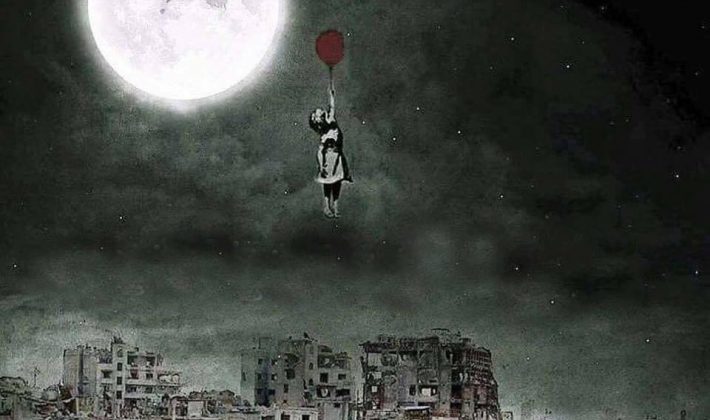Mirza Ajnadžić
“Mom! Why are you taking me to pee from aunt's window? She'll be mad!” – I can just imagine what was going through my mom's head when I told her this in a pitch black dark on our walk over Grebak so called Path of Life (forgive me if I got the translation bad). I can remember now as clear as it was back then asking my mother if she can can take me to pee. I was hallucinating, but still to this day I see myself pissing from my aunt's window in Gorazde. I was five, it was around 3 a.m. and we were a part of a group traveling from Gorazde (Bosnia and Herzegovina) to Zenica where my uncle and his family were. My mom just gave birth to my sister who was born in Gorazde and was the first “War Baby”. Everybody knew that my sister has the habit of sucking her thumb finger and that she refused any kind of pacifier but still people would show up every day on our doorstep to bring a new one.
“Here, I found this. Maybe she'll take this one.” – People, who saw this as their rescue mission, would say.
The result? Always be the same. She would take it for a few seconds, spit it out and her thumb was back in her mouth. She will probably hate me for saying this – but to this day when she is nervous she would address to her thumb as a problem solver.
My mother could barely walk during this 70+ kilometers path. Being the slowest in the group, which also consisted of elderly people, you would hear them wondering how come she still keeps pace with them even though she arrives last on every next resting station.
My story of traveling across Grebak could be written only if I would to write a book. For some years I have a plan of collecting all of the memories from my parents and compare it to my own since some of the things I “remember” didn't happen at all. It would be so interesting to compare this from my point of view.
However, the war was my reality, and I didn't know about any other. I can't remember being too sad, or too scared for that matter. I can remember being hungry most of the time but that didn't stick with me as a problem. And again, it was a reality. People get used to all sort of things, and accept them as normal. I guess I can thank my parents for protecting me the best they could.
The only time I remember being scared was some years later in Sarajevo when my mother went out for some drinking water and the bombing started. My sister, who was 2-3 years old at that time, and I were inside our flat. I tried to comfort her.
“Mom will be back soon! The bombing is not close to us.” – I whispered like the bombs can hear me.
I was 7 or 8 years old – of course I was comforting myself and she probably didn't know what was happening. Mom did come back. She came back from much scarier situations. Hack it was my mother – one of the toughest, if not the toughest, people I know to this day. I remember her coming home covered in bruises because some men tried to cut the line while the Red Cross or some similar organization gave humanitarian help. She didn't want to step aside so she fought with them. She got our food even though she came home like she was on a war frontline.
Come to think about it – it was a frontline. It was a frontline when she made a soldier to drive three of us in a van because she had only one mission – to save me and my sister. Soldier got into a trouble afterwards because he had clear orders not to take anyone. She came as a winner from that frontline every time we had something to eat. Every day that we survived. Every song that she taught me. To this day I can only spell Azbuka (the Cyrillic alphabet) by singing it because she taught me that way.
Women, children and old men are always on a front line of any war. My frontline wasn't too tough because my mother and father were there to protect me. I wasn't wondering why doesn't the World, Europe or anyone else react to what is happening to us.
I bet she did every day. I bet that every women and men these days in Aleppo are asking themselves the same question. For years people in Syria, Palestine, Nigeria and all around the world in conflict zones are wondering the same when they have a time to think from all the killing around them.
“How come no one sees what is happening!?” – millions of voices shout.
Not realizing that we see, we just choose not to. Some of us hoping and maybe partly hating ourselves, as I am right now, that some social media writings will help.
I'm writing this in English because of my English speaking friends, and hoping that this way more people will read. I know that after I rest my keyboard I'll finish my coffee and go on with my life embarrassed. Hoping that today is going to be the day that someone will choose to hear as someone chose to hear us some two decades ago.


